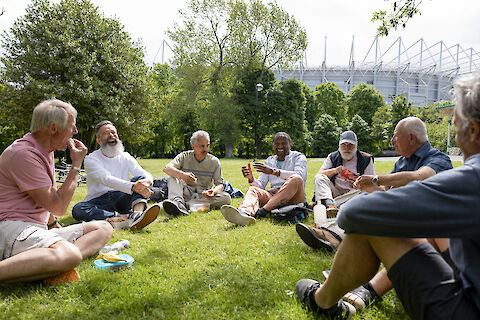
Alzheimer's disease affects millions of people worldwide, impacting not only the patients but also their loved ones. With no cure yet available, finding ways to slow down its progression is vital, and one key factor that can help with this is social interaction. Staying socially active is crucial for seniors, as it brings numerous mental and physical health benefits.
Today, we'll explore the correlation between social interaction and slowing down Alzheimer's, delving into the importance of maintaining an active social life/ Well explain how seniors can stay engaged, and the role of caregivers and family members in facilitating these connections. Ready to learn how a little bit of company can make a big difference in the lives of those affected by Alzheimer's? Read on!
The Mental Health Benefits of Social Interaction
Engaging in regular social interaction provides numerous mental health benefits for seniors, with improved cognitive function being one of the most significant. Participating in conversations, solving problems together, and playing thought-provoking games help stimulate the brain and keep the mind sharp. Studies show that seniors with an active social life experience a slower better cognitive function compared to those who were more isolated.
Another mental health benefit of social interaction is the reduced risk of depression and anxiety. Emotional support from friends and family can help seniors feel more connected and less lonely, which in turn can lower the likelihood of developing mental health issues.
Physical Health Benefits of Social Interaction
In addition to its mental health benefits, social interaction can also positively influence seniors' physical health. When seniors participate in group activities or exercise classes, they are more likely to maintain a consistent physical activity routine, contributing to better overall health.
Socially active seniors tend to have lower blood pressure and a reduced risk of cardiovascular disease. Seniors with a strong social network have been found to have lower blood pressure than their less social counterparts, possibly attributed to better stress management and emotional support
How Seniors Can Stay Socially Engaged
Joining clubs or organizations tailored to their interests, such as senior centers, book clubs, or gardening groups, provide opportunities to meet new friends and maintain a sense of purpose. Participating in group activities, like exercise classes, art workshops, or volunteering, also helps seniors stay active and connected to their communities.
Technology can play a role in helping seniors stay socially active. Video calls, online forums, and social media platforms enable seniors to connect with friends and family, participate in virtual events, and share their interests with others, even when they can't meet in person.
How Caregivers and Family Members Can Help
Caregivers and family members play a significant role in promoting social engagement for seniors affected by Alzheimer's. They can encourage their loved ones to participate in social activities, facilitate connections with friends and family, and provide transportation or assistance as needed. By supporting seniors in remaining socially active, caregivers and family members can play an essential role in slowing the progression of Alzheimer's and improving their loved one's quality of life.
Turn To Senior Helpers
If you or your loved one life in the Grant, Huntington, Allen, Miami, or Whitley areas, contact us at Senior Helpers Wabash for information about our compassionate in-home care services. From friendly companionship to assistance with the day-to-day tasks required of independent living, our professionals are by your side.